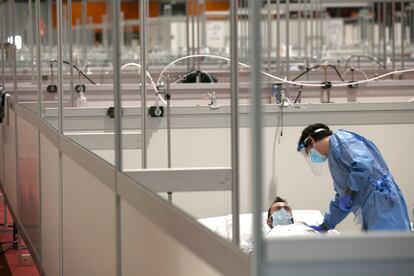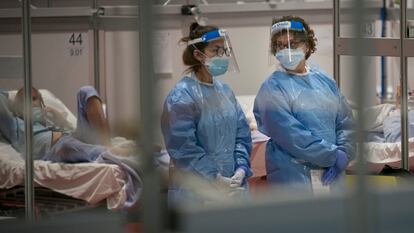Daily coronavirus deaths in Spain fall to 367, the lowest figure in a month
For the first time since the beginning of the crisis, there were more recoveries in a 24-hour period than new infections

The number of daily coronavirus deaths registered in Spain was 367 on Friday, according to the latest figures supplied by the Health Ministry. This is the lowest number since March 21, when there were 324 fatalities. It is also a slight drop on yesterday’s figure of 440.
There have been a total of 22,524 official Covid-19-related fatalities since the pandemic hit Spain, while 92,355 patients have recovered from the illness and have been discharged from hospital, a daily rise of 3,105. Eight regions in Spain registered fewer than 10 daily coronavirus deaths: Asturias, the Balearic Islands, Cantabria, Extremadura, Galicia, Murcia, Navarre and La Rioja.
It is the first day that we can say there were more recoveries than new infectionsFernando Simón, the director of the Health Ministry’s Coordination Center for Health Alerts
On Friday, the Health Ministry began to report on the total number of coroanavirus cases according to PCR test results, which are the most reliable detector of the disease; and serological tests, which are faster and less expensive. If only PCR tests are counted, the total number of infections in Spain is 202,990 – a daily rise of 2,796. In the second case, the figure is 219,764.
If only cases confirmed via PCR tests are taken into account, Friday marks the first day that Spain has registered more recoveries than new infections since the beginning of the crisis – 3,105 compared to 2,796.
Speaking at the government’s daily press conference on Friday, Fernando Simón, the director of the Health Ministry’s Coordination Center for Health Alerts, said the figures were “good news.”
“It is the first day that we can say there were more recoveries than new infections. This is the best figure recorded in weeks,” said Simón.
The health official added that the return of some non-essential workers, in sectors such as construction and industry, two weeks ago had not yet had a “significant impact” on the transmission rate.
Last week, the number of daily deaths in Spain oscillated between 500 and 600. This trend changed on Sunday, when 399 fatalities were recorded, the lowest figure since March 22. Although the figure may have been influenced by the under-reporting of coronavirus statistics typically seen on weekends, the trend has remained stable. This week, there were 430 coronavirus deaths on Monday, 430 on Tuesday and 435 on Wednesday.
Only children out
Despite having some of the world’s strictest confinement measures – children will only be allowed out for an hour a day starting on Sunday – Spain has been one of the world’s hardest-hit countries. Authorities placed the country in lockdown on March 14 and citizens have only been allowed out for essential business.
At a news conference on Friday afternoon, Health Minister Salvador Illa ruled out the possibility of lifting restrictions for any other demographic group. “There is no data allowing us to anticipate the easing of measures for groups other than children.”
Illa also warned that the gradual deescalation of the lockdown “is going to be complex and demand the best of ourselves, of all the administrations in the country.”
Finance Minister María Jesús Montero, who also made statements on Friday, deflected criticism about the fact that the government first said that children would only be able to go out on essential errands with their parents, then backtracked just hours later amid a wave of social media outrage. “This government is prudent and also knows how to listen,” said Montero.
Prime Minister Pedro Sánchez held a Cabinet meeting on Friday to implement the third extension to the state of alarm after securing congressional support on Wednesday. The country will remain in lockdown until May 9, although restrictions for children will be partially eased this Sunday.
On Friday morning, the radio station Cadena SER advanced the criteria for the deescalation of the confinement measures in Spain. These include: a hospitalization rate below 30%, and intensive care units at 50% capacity.
Government spending on medical supplies

The Spanish government has spent €1 billion of the special fund set up in early March to purchase much-needed medical supplies. Using this fund, the government bought half a million surgical face masks for €0.03 per unit, and more than 33 million for €0.86, or in other words face masks that were 28 times more expensive than the others. Before the coronavirus crisis, surgical masks were bought for €0.027 per unit, according to a regional purchasing manager.
According to an EL PAÍS analysis of the public contracts, this price difference was also apparent in other purchases, such as FFP2 face masks, where the most expensive product was double the cost of the cheapest.
So far, the government has spent €554 million on different types of face masks, €75.4 million on different types of respirators and €72.7 million on diagnostic tests. The analysis also found that the government had to pay €475 million in advance for 14 contracts with Chinese companies. In 12 of the contracts, the company asked for 100% of the order amount.
EU agrees to coronavirus recovery plan
The European Union reached an agreement on Thursday to create a recovery plan to deal with the economic fallout of the coronavirus crisis. But the six-hour summit, held by video conference, produced few clear details about what this plan would entail. European leaders agreed to set up a recovery fund, linked to the EU budget, but there were major differences between members about the amount of the fund and how it should be distributed.
Despite these differences, the president of the European Council, Charles Michel, said he was “optimistic” about the talks because the leaders had shown “real sense of urgency.” “Even if it is difficult, I feel there is a strong political will to act together,” he said.
1.5 million foreigners leave Spain
Spain’s Foreign Ministry has been working to help repatriate foreigners back to their home countries. Foreign Affairs Minister Arancha González Laya told Congress on Thursday that “1.5 million people, from within and outside the European Union, have left Spain these days.” Most of these foreigners were tourists or in Spain for other reasons.
Spain receives the second-largest number of visitors in the world. More than 83 million tourists visited the country last year, according to the National Statistics Institute (INE).
English version by Melissa Kitson.







































